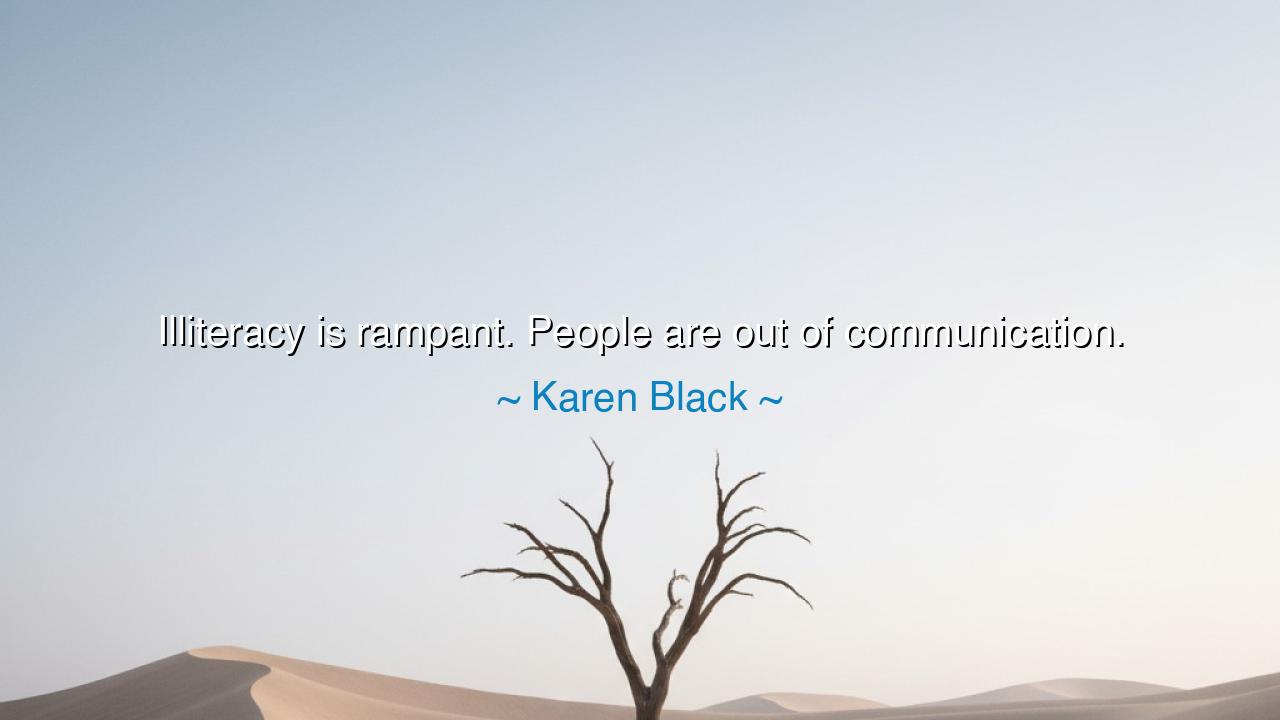
Illiteracy is rampant. People are out of communication.






Host: The train station was almost empty at midnight. Only the sound of rain hitting the glass roof, the distant hum of engines, and the crackle of old announcements echoing through speakers no one listened to anymore. The neon signs flickered, half-dead, spelling fragments of words that had long lost their meaning — Departures, Connections, Delay.
In the far corner, Jack sat on a bench, hunched over his phone. The blue light carved his face into cold geometry. The screen scrolled endlessly — words, images, opinions, none of them landing anywhere near understanding.
Jeeny entered, shaking the rain from her coat, her hair damp and her expression quietly exhausted. She spotted him instantly — alone, glowing in artificial light like a fossil from the digital age.
Jeeny: “You’re still here?”
Jack: “Trains are late. Or I am. Hard to tell which anymore.”
Jeeny: “You could read something. Pass the time.”
Jack: “I am reading. Thousands of words a minute. None of them mean anything.”
Jeeny: “Then you’re not reading. You’re scrolling.”
Jack: “Same difference.”
Jeeny: “No. It’s the difference between touching and feeling.”
Jack: “Karen Black once said, ‘Illiteracy is rampant. People are out of communication.’ She said that decades ago. Can you imagine what she’d say now?”
Jeeny: “She’d say we turned conversation into content.”
Jack: “And truth into trend.”
Jeeny: “And loneliness into lifestyle.”
Host: A train horn sounded in the distance — long, mournful, ancient. The sound filled the empty space like memory trying to breathe. Jack set his phone down on the bench. Its screen went dark instantly, as if relieved.
Jack: “You ever feel like we’ve forgotten how to speak to each other?”
Jeeny: “No, Jack. We remember. We’ve just lost the patience for listening.”
Jack: “So we fill the silence with noise.”
Jeeny: “Because silence makes us confront ourselves. And that’s the one conversation no one wants to have.”
Jack: “You think we’re all illiterate now?”
Jeeny: “In a way. Not because we can’t read words — but because we can’t read meaning.”
Jack: “That’s poetic.”
Jeeny: “No, it’s terrifying.”
Host: The rain grew louder, drumming against the windows like the heartbeat of a restless city. A man at the other end of the platform was shouting into his phone, his voice swallowed by static. A woman nearby stared blankly at a glowing advertisement for noise-canceling headphones.
Jack: “Everyone’s connected. All the time. And yet, we’re strangers even to ourselves.”
Jeeny: “Connection isn’t communication.”
Jack: “You sound like my grandmother.”
Jeeny: “She probably remembered what empathy felt like.”
Jack: “You think we’ve traded empathy for efficiency?”
Jeeny: “Exactly. We measure success by speed — how fast we reply, how quickly we move on. No one lingers anymore.”
Jack: “Lingering doesn’t scale.”
Jeeny: “Neither does love.”
Host: She sat down beside him. The bench creaked slightly. For a moment, neither spoke — the silence between them more articulate than any algorithm.
Jack: “You know what’s strange? We write more than ever — texts, posts, captions, replies — but we say less. It’s like the more we talk, the emptier it gets.”
Jeeny: “Because talking isn’t the same as sharing.”
Jack: “So what’s missing?”
Jeeny: “Presence. The kind that isn’t filtered through a screen.”
Jack: “You think it’s too late to get that back?”
Jeeny: “No. But we’d have to relearn how to be uncomfortable.”
Jack: “With silence?”
Jeeny: “With honesty.”
Host: The lights above them flickered, humming like tired fireflies. Jeeny pulled a small, battered book from her bag — the spine cracked, the pages soft with use. She offered it to him.
Jeeny: “Here. Try this.”
Jack: “A book?”
Jeeny: “Yes. Remember those? Ink, paper, patience.”
Jack: “What is it?”
Jeeny: “Letters between people who still believed words could save something.”
Jack: “And did they?”
Jeeny: “No. But they died trying to communicate. There’s dignity in that.”
Jack: “That’s bleak.”
Jeeny: “It’s beautiful. Failure in pursuit of connection is better than comfort in isolation.”
Jack: “You’re starting to sound like a preacher.”
Jeeny: “Then maybe you should start believing again.”
Host: The train arrived — its brakes screeching, its lights slicing through the mist. The sound was violent but alive. Passengers stepped off, heads bowed, eyes on screens, walking ghosts of constant conversation.
Jack: “You ever wonder if language will survive us?”
Jeeny: “Language will. Meaning might not.”
Jack: “So what do we do?”
Jeeny: “Start small. Talk to someone. Look them in the eye. Remember that silence isn’t the enemy — indifference is.”
Jack: “You think it’s that simple?”
Jeeny: “It has to be. Complexity is what killed us.”
Jack: “You always sound sure of your hope.”
Jeeny: “That’s because it’s the only rebellion left.”
Host: The train doors closed, but they didn’t board. They just sat there, the two of them — two humans suspended in the space between noise and meaning.
Outside, the rain slowed, and the first light of dawn began to rise through the mist — pale, deliberate, forgiving.
Host: Because Karen Black was right — illiteracy is rampant.
Not of letters,
but of listening.
Not of speech,
but of understanding.
People are out of communication,
not because they lack words,
but because they’ve forgotten that language begins in empathy —
in the courage to pause,
to hear,
to stay.
Host: And as Jack and Jeeny sat together in the quiet,
the train pulled away —
not with them,
but because of them.
Somewhere between the silence and the sound,
they had remembered what it meant
to communicate again.






AAdministratorAdministrator
Welcome, honored guests. Please leave a comment, we will respond soon